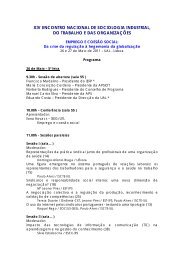Web-based Learning Solutions for Communities of Practice
Web-based Learning Solutions for Communities of Practice
Web-based Learning Solutions for Communities of Practice
Create successful ePaper yourself
Turn your PDF publications into a flip-book with our unique Google optimized e-Paper software.
Conditions and Key Success Factors <strong>for</strong> the Management <strong>of</strong> <strong>Communities</strong> <strong>of</strong> <strong>Practice</strong><br />
intended <strong>for</strong> the managerial team to achieve important organizational goals. Our analysis provides: (a)<br />
a reflection regarding the Key Success Factors in the process <strong>of</strong> integrating communities <strong>of</strong> practice,<br />
(b) insight to the structure <strong>of</strong> a model <strong>of</strong> cultivation, intended as a guideline <strong>for</strong> new experiences in this<br />
area, and (c) an in<strong>for</strong>mative account <strong>of</strong> this model’s adaptation to the studied organizations.<br />
IS THE IDEA OF MANAGING COP’S<br />
AN OXYMORON?<br />
<strong>Communities</strong> <strong>of</strong> <strong>Practice</strong> (CoPs) are activity systems<br />
that include individuals who are united in<br />
action and in the meaning that action has <strong>for</strong> them<br />
and <strong>for</strong> the larger collective (Lave and Wenger,<br />
1991). CoPs are not part <strong>of</strong> <strong>for</strong>mal structures;<br />
they are in<strong>for</strong>mal entities that exist in the mind <strong>of</strong><br />
each member. When people participate in problem-solving<br />
and share the knowledge necessary<br />
to solve problems, it is possible to speak about<br />
the generation <strong>of</strong> knowledge in CoPs (Wenger,<br />
1998). There<strong>for</strong>e, CoPs are groups whose members<br />
regularly engage in sharing and learning <strong>based</strong><br />
on common interests, and can improve organizational<br />
per<strong>for</strong>mance (Lesser & Storck, 2001).<br />
CoPs can (and are more likely to) extend beyond<br />
the boundaries <strong>of</strong> the firm (Malone, 2002), and<br />
they are about content (about learning as a living<br />
experience <strong>of</strong> negotiating meaning) not about<br />
<strong>for</strong>m. In this sense, they cannot be legislated<br />
into existence or defined by order. They can be<br />
recognized, supported, encouraged, and nurtured,<br />
but they are not reified, designable units (Lesser<br />
and Storck, 2001). All these arguments can lead<br />
managers to question if it’s possible to consider<br />
CoP as a managerial initiative oriented to achieve<br />
organizational goals.<br />
On the other hand some other authors, considering<br />
the epistemic components and theoretical<br />
background <strong>of</strong> CoP’s have pointed out that CoP’s<br />
may not always contribute to business settings,<br />
due to their self managed character (Kimble &<br />
Hildreth, 2004; Roberts, 2006). Others have shown<br />
that CoP’s contribution to innovation is not always<br />
clear, while it only happens in some specific situations<br />
(Swan et al., 2002; Mutch, 2003), and even<br />
the negative impact that structure can exert over<br />
practice (Thompson, 2005) if the nature <strong>of</strong> the<br />
interrelations is not dressed in a sound way.<br />
All this evidence makes the previous question<br />
even more complex: even if CoPs can be managed,<br />
it is not evident in which conditions or situation<br />
it should be the best option, or when the risks<br />
undertaken can exceed the potential gains.<br />
In this chapter, the authors approach CoPs from<br />
a management perspective and practice. Although<br />
CoPs are organic and spontaneous, the purpose<br />
<strong>of</strong> the study is to analyse the CoPs promotion<br />
and cultivation from the organizational management<br />
point <strong>of</strong> view, there<strong>for</strong>e, as organizational<br />
management instrument. This framework can<br />
generate incoherencies between the situated and<br />
social learning theory and the consideration <strong>of</strong> a<br />
CoP’s system as a management tool (CoP). For<br />
the purposes <strong>of</strong> advancing our understanding in<br />
this path, we have summarized the main contradictions<br />
between the epistemic component <strong>of</strong><br />
CoPs (theoretical point <strong>of</strong> view) and its expected<br />
managerial use (management tool point <strong>of</strong> view)<br />
in the following questions:<br />
• Should CoPs always be organic or could<br />
they be promoted by the organizations?<br />
• Are CoPs designable units by the organizations?<br />
• The cultivation <strong>of</strong> CoPs should be motivated<br />
by individuals or by organizations?<br />
• How is it possible to achieve the sharing<br />
<strong>of</strong> knowledge? Is it necessary a tangible<br />
motivation or can it be intangible?<br />
307



